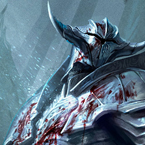One of the most newbie-friendly elements of Flesh and Blood is the Hero/Talent/Class system that sections off the card pool into manageable blocks. As a new player, you can begin your collection with a hero who appeals to you, and only have to acquire the cards for that hero's class (and talent)- with a few synergistic generics. The set design further encourages this approach, focusing each set on specific heroes/classes/talents so that your purchases are guaranteed to relate to your deck.
But as your collection and skill develop, you can do yourself a disservice by remaining siloed in your specialized card pool. There are many benefits to exploring other classes, even if you have no intention of ever showing up to an event with anything other than your single favorite class. In today’s article, I’ll explore how playing with other classes can be time well-spent during your tournament prep and practice.
Why Stray From Your Class?
I know what you may be thinking. "Why should I try to play class X/Y/Z when I only want to play Class A?" There’s certainly nothing wrong with maining a single class and gaining a ton of experience and expertise with it. (Certainly well-known players come to mind who are known for this.)
By exploring and practicing with other classes, you will gain fundamental experience and game knowledge with your main class as well. Let’s dive in.
5 Reasons to Stray
- From a fundamental game knowledge standpoint, experimenting with other classes will help familiarize yourself with the cards, strategies, and deckbuilding choices for different classes.
- Looking to shake up the meta or exploit some weaknesses in your local scene? If you have interest in building decks, tuning them, and watching them evolve over time, you will become a better deck builder by expanding that game knowledge and understanding what all the top decks in the format are trying to do.
- You’ll get better at sealed events. Even if you are a die-hard constructed player, chances are you will play some form of limited if you plan to pursue higher-level tournament play. Playing other classes- especially those with drastically different playstyles than the class(es) you main- gives you an especially pronounced leg up on new sets!
- You may find new classes that you like to play. It’s wonderfully refreshing to find new life in a game that you love and play often. For example, I took up playing Levia in Blitz as a pet project when Monarch first released, loving the contrast of her hyper-aggressive playstyle as compared to Bravo’s controlling calculation.
- Most importantly, you’ll get better at playing your main class(es).
Yes, that sounds counter-intuitive, but hear me out. By playing classes you usually do not touch, you will gain deeper understanding what your opponent is able to do to pressure you. You'll see the weaknesses in your class’ strategy on a turn-by-turn basis, and spot how a savvy opponent might seek to exploit those openings. With a better understanding of what it is like to be on the opposite side of the table, you can gain insight into what your opponent is thinking- and what cards and lines of play they are looking for at any given moment.
Between pitching, drawing multiple cards per turn, sideboarding (in Classic Constructed), and the many in-game mechanics, Flesh and Blood is a very complex game to master despite its simplified and robust ruleset. Different classes interact with this rules in very different ways. For example, Bravo is a controlling hero looking to defend and make the opponent run out of gas in the late game; Ira looks to put on the offensive pressure from the start and force the opponent to block heavily each and every turn without being able to hit back.


I can think of no better example of the benefits of learning another class than this. One of my good buddies in Flesh and Blood, Wolsne, is an incredible Kano player. As a Bravo main, I never feel more threatened in this matchup than when Wolsne is on the other side of the table. He can seemingly conjure lethal from thin air, using a complex string of interactions and strategic choices that seem convoluted at best. But in reality, it’s intricately calculated odds and a fundamental understanding of the contents of his deck. As you may have learned yourself, it’s hard to play Kano without practice, even if you are an experienced Flesh and Blood and TCG player.
Though I know the key cards and lines of play to prioritize from my side of the table against Kano, I didn’t gain that higher level of knowledge until I spent a few games playing the class myself. I have played tons of events with my friend Wolsne, and have watched him coach many new Wizard players on the deck’s potential in Blitz between rounds. Those were all learning opportunities- and I used them to improve my play as Bravo. That fundamental understanding of Kano's strategies gave me confidence in my own play against him, demonstrated by my taking down three Kano players in Channel Fireball’s Blitz Skirmish last season and ultimately securing a top 8 finish.
Though I know the key cards and lines of play to prioritize from my side of the table against Kano, I didn’t gain that higher level of knowledge until I spent a few games playing the class myself.
Learning to play Kano myself (at least at a novice level) ultimately proved to be a more fruitful use of my Flesh and Blood practice time than simply jamming additional Bravo games against Kano. It allowed me to see between the lines and better anticipate my opponent’s thinking at each point in the match. Against Kelvin Law's Kano in the CFB event, I tucked away an early Sigil of Solace (red) in my Arsenal and used it as a calculated risk to try to bait out what my opponent would perceive to be an opportunity to deal lethal damage. I went out of my way throughout the game to not pitch/play my copies of Pummel to make him think it was an attack reaction that I was holding onto for a lethal attack of my own.
I pressured early and often with Anothos, holding up as many blue cards in hand to pitch against the onslaught of arcane damage as I worked to count to 15. My gambit paid off when I was able to use the Sigil of Solace to protect myself from lethal attacks and press in with a Pummel and Anothos for the win without worrying about overexposing myself to a potential lethal barrage of spells at instant speed. Through learning Kano myself, I knew what types of interactions Sigil of Solace would protect me from, and most importantly, the best time to use Sigil of Solace as to not give my opponent an opportune moment to respond to my instant cast.
How to Gain Experience with Other Classes
"OK Drew, that's all well and good, but I can't go out and build 8 more competitive decks just to improve my actual deck."
Yes, budgets are real- and important. And even if you're not limited by budget, there's practical limits to the breadth of our collections. And there's the question of why you'd own all the cards for classes that aren't your focus.
Thankfully, there are many ways to get experience with other classes that are totally free*.
*Free insofar as you don't need to own the cards.
5 Ways to Gain Experience with Classes You Don't Own
- If you have Tabletop Simulator on Steam, you can load up the free OSC Flesh and Blood mod and find games in the official Flesh and Blood Community discord. Once you get used to the controls, this is a great way to experiment with other classes and decks without dropping a ton of cash or needing to print hundreds of proxies.
- Borrow decks from your friends and swap decks for events. You may need to make some friends at your local scene; as you get comfortable and build trust, you may find someone willing to swap decks with you for Armory events (or just to play some casual games with each others’ decks). Don’t just ask strangers on this one, get to know them first!
- Proxy it up. As long as your proxies are good, most people won’t have any problems with you using them in friendly webcam or in-person games. Just don’t bring them to an officially-sanctioned event.
- Play limited! While it can be exciting to burn through booster packs of the new set, you can use these to gain experience both in the format and with other classes that you don’t ordinarily play. Flesh and Blood does a great job of making you feel like you are experiencing most of what the class has to offer, even without the majestics and legendary cards. You can find people willing to play limited in the Discord group, especially around new product release windows.
- Get involved in the discussion. Each class on the official community Discord server has its own conversation channel. These are great places to connect with other players of these classes, get help, ask questions, and gain new insights.
Though many of us will find a single favorite class to focus our time and energy on, there is immense value to learning and practicing with other classes as well. I hope this article was insightful for you, and good luck out there as we look forward to Tales of Aria.
Have any questions? Any tips of your own that help streamline learning new classes? Share them in the comments below!






